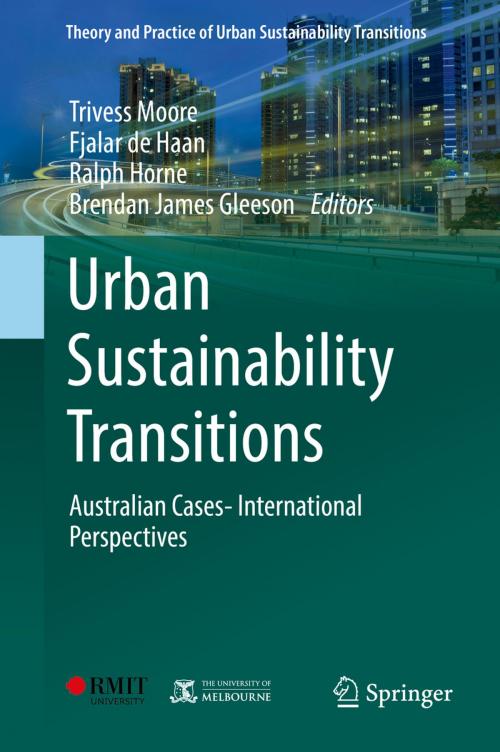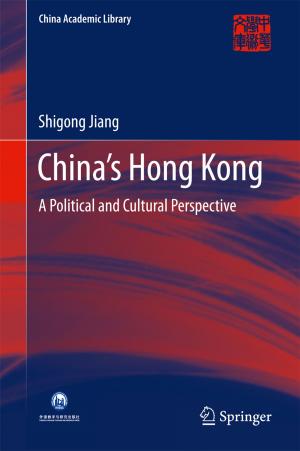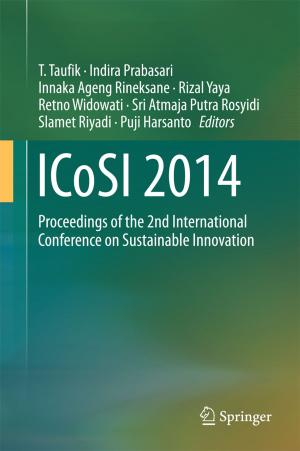Urban Sustainability Transitions
Australian Cases- International Perspectives
Nonfiction, Social & Cultural Studies, Social Science, Human Geography, Science & Nature, Science, Biological Sciences, Environmental Science, Nature| Author: | ISBN: | 9789811047923 | |
| Publisher: | Springer Singapore | Publication: | October 27, 2017 |
| Imprint: | Springer | Language: | English |
| Author: | |
| ISBN: | 9789811047923 |
| Publisher: | Springer Singapore |
| Publication: | October 27, 2017 |
| Imprint: | Springer |
| Language: | English |
This book contributes to current debates regarding purposive transitions to sustainable cities, providing an accessible but critical exploration of sustainability transitions in urban settings. We have now entered the urban century, which is not without its own challenges, as discussed in the preceding book of this series. Urbanization is accompanied by a myriad of complex and overlapping environmental, social and governance challenges – which increasingly call into question conventional, market-based responses and simple top-down government interventions. Faced with these challenges, urban practitioners and scholars alike are interested in promoting purposive transitions to sustainable cities.
The chapters in this volume contribute to the growing body of literature on city-scale transformative change, which seeks to address a lack of consideration for spatial and urban governance dimensions in sustainability transitions studies, and expand on the basis established in the preceding book. Drawing on a range of perspectives and written by leading Australian and international urban researchers, the chapters explore contemporary cases from Australia and locate them within the international context.
Australia is on the one hand representative of many OECD countries, while on the other possessing a number of unique attributes that may serve to highlight issues and potentials internationally. Australia is a highly urbanized country and because of the federal political structure and the large distances, the five largest state-capital cities have a relatively high degree of autonomy in governance – even dominating the rest of their respective states and rural hinterlands to a certain extent. This context suggests that Australian cases can provide interesting “test-tube” perspectives on processes relevant to urban sustainability transitions worldwide. This volume presents an extensive overview of theories, concepts, approaches and practical examples informed by sustainability transitions thinking, offering a unique resource for all urban practitioners and scholars who want to understand and transition to sustainable urban futures.
This book contributes to current debates regarding purposive transitions to sustainable cities, providing an accessible but critical exploration of sustainability transitions in urban settings. We have now entered the urban century, which is not without its own challenges, as discussed in the preceding book of this series. Urbanization is accompanied by a myriad of complex and overlapping environmental, social and governance challenges – which increasingly call into question conventional, market-based responses and simple top-down government interventions. Faced with these challenges, urban practitioners and scholars alike are interested in promoting purposive transitions to sustainable cities.
The chapters in this volume contribute to the growing body of literature on city-scale transformative change, which seeks to address a lack of consideration for spatial and urban governance dimensions in sustainability transitions studies, and expand on the basis established in the preceding book. Drawing on a range of perspectives and written by leading Australian and international urban researchers, the chapters explore contemporary cases from Australia and locate them within the international context.
Australia is on the one hand representative of many OECD countries, while on the other possessing a number of unique attributes that may serve to highlight issues and potentials internationally. Australia is a highly urbanized country and because of the federal political structure and the large distances, the five largest state-capital cities have a relatively high degree of autonomy in governance – even dominating the rest of their respective states and rural hinterlands to a certain extent. This context suggests that Australian cases can provide interesting “test-tube” perspectives on processes relevant to urban sustainability transitions worldwide. This volume presents an extensive overview of theories, concepts, approaches and practical examples informed by sustainability transitions thinking, offering a unique resource for all urban practitioners and scholars who want to understand and transition to sustainable urban futures.















